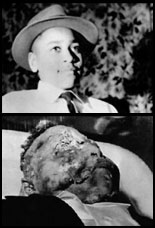VIDEO: The Murder of Emmett Till (Eyes on the Prize, 15 min)

(FinalCall.com) – A Leflore County (Mississippi) grand jury on Feb. 23 returned a “no-bill” in the manslaughter case of Carolyn Bryant Donham, 73; meaning it found insufficient evidence to prosecute her for the 1955 slaying of Emmett Louis Till, a 14-year-old Chicago boy who was visiting relatives in Money, Mississippi.
District Attorney Joyce Chiles, a Black woman, who according to press accounts, grew up on a plantation near where the 1955 killing took place, had sought the manslaughter charges against Ms. Donham, who was suspected of pointing out the boy to her husband after accusing him of whistling at her.
Emmett Louis Till was kidnapped from the home of his uncle in Money at night. Three days later, his body was found in the Tallahatchie River. A cotton gin fan was tied to his bloated body. His left eye was missing, and his right eye was dangling on his cheek. His mother, Mamie Till-Mobley, who passed away in 2003, demanded that his casket remain open. The photo of her son’s disfigured face was published by JET magazine on its cover.
“I disagree wholeheartedly with the grand jury decision,” filmmaker Keith Beauchamp told The Final Call, during a telephone interview on Mar. 6. It was Mr. Beauchamp’s 2004 documentary, The Untold Story of Emmett Louis Till, that generated enough public interest forcing the FBI to re-open the case. Federal authorities decided in 2006 that the statute of limitations for federal charges had run out.
The FBI turned over its 8,000 pages of documentation to the state of Mississippi in 2006 suggesting, according to The Associated Press, they take a closer look at Ms. Donham. There were suggestions from witnesses that a women’s voice was heard at the scene of the abduction.
In 1955, an all-White Tallahatchie County jury took 67 minutes to acquit Ms. Donham’s first husband, Roy Bryant, and his half-brother J.W. Milam. However, in a 1956 interview with Look magazine, the two admitted to killing Emmett Louis Till.
“The FBI did its job,” quipped Mr. Beauchamp. “I believe there was enough evidence to get an indictment on manslaughter,” he said. He argues further that it all hinged on how the evidence was presented. “How did a Black district attorney and a grand jury that was 70 percent Black let that woman just walk away?” Mr. Beauchamp asked.
The young filmmaker is not the only one questioning the grand jury decision. A headline in the Delta Democrat Times on Mar. 3 stated: “Grand Jury came back with poor decision.”
USA Today says that the prosecutor believed the evidence to indict was not there. “It would have been very easy for that grand jury to have returned a true bill based solely on emotion and the rage they felt,” Ms. Chiles told USA Today. She said she “commended” them for not doing that.
Charles Evers, 84, the brother of slain civil rights leader, Medgar Evers, told The Final Call that his initial reaction to the decision was, “My God, how can a predominately Black grand jury do a thing like this?”
Then after a short pause, he said, “I’m not really surprised. The elected officials we have now don’t really have our interests at heart.”
“I just don’t understand it; we are going backwards as a people. These young people today are too worried about hurting somebody’s feelings,” Mr. Evers stressed. He added, what happened to Emmett Till happened, and there is no getting around that. “We have to do what is right,” Mr. Evers argues.
Mr. Beauchamp said he isn’t done fighting yet. “I put 12 years into this,” he said. He was 10 years old when he discovered the JET magazine in the home of his parents in Louisiana. “I’m not done yet,” he said, over and over.
“I want the FBI files released to the public. I want a Congressional review,” Mr. Beauchamp said before hanging up the phone.
“Talk about wishful thinking,” writes journalist David Holmberg, who has written about the Till case for such publications as the Nation, Newsday, The Daily News and The Palm Beach (Fla.) Post.
Writing a for MaximNews.com UN, on Mar. 12, Mr. Holmberg surmises: “The Till case has come to the end of the road in the American criminal justice system,” adding, “The process of retrospective exploration of this tragedy has played itself out.”












